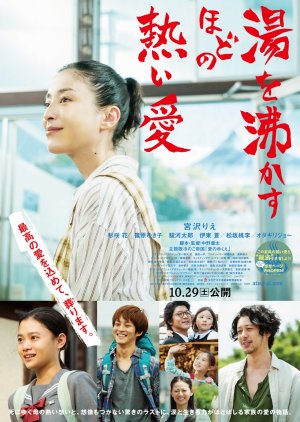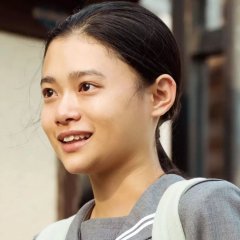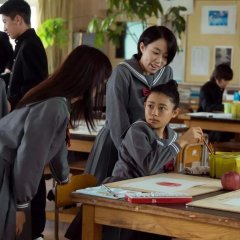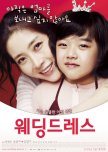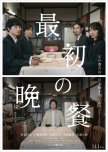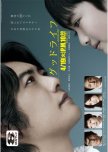 Cultural Shocks I Experienced While Watching Dramas
Cultural Shocks I Experienced While Watching Dramas Futaba, whose husband suddenly left her one year ago, lives with her shy daughter, Azumi. When Futaba abruptly receives a diagnosis of a terminal illness, she aims to use the brief amount of time she has left to bring back her husband, restart the family's shut-down bathhouse business, and set Azumi on the path to independence. (Source: jfdb) Edit Translation
- English
- 中文(台灣)
- Русский
- Português (Brasil)
- Native Title: 湯を沸かすほどの熱い愛
- Also Known As: Burning Love Enough to Boil Water , Yu o Wakasu Hodo no Atsui Ai
- Screenwriter & Director: Nakano Ryota
- Genres: Life, Drama
Cast & Credits
- Miyazawa Rie Main Role
- Sugisaki Hana Main Role
- Odagiri JoeSachino Kazuhiro [Azumi's father]Support Role
- Matsuzaka ToriMukai TakumiSupport Role
- Ito AoiKatase AyukoSupport Role
- Shinohara YukikoSakamaki KimieSupport Role
Reviews

Her Love Boils Bathwater sets itself to be a sentimental family drama. But Ryota Nakano takes a more light-hearted approach. Instead of following a very dramatic ill-single-mother-making-her-time-worthwhile take (and it's very tempting to), he doesn't. Instead, he rallies his great cast to launch the story foreword.
And that's the film's greatest strength—its cast. Hana Sugisaki won Best Supporting Actress for her role and she proves once again that she's one of Japan's most promising young actresses perhaps taking on the footsteps of the chameleon actor, Fumi Nikaido (a personal bias).
Perhaps being Japan's entry to the Best Foreign Film list is a little bit of a stretch since the film is simplistic but heartfelt, strengthened by its cast. Its little moments and character interactions are its charm. Nakano doesn't patronize these characters—he shows them as flawed ones and as imperfect beings but what's great is how that all plays out.
The cinematography is stunning, paired with lukewarm colors yet vivid. The score truly embraces the scenes. Yes, I cried.
Was this review helpful to you?

Right from the cast that interacts nicely with history, balancing the impending tragedy with gentle humor and a quirky procession of quirky characters, the film features an impressive collection of characters and bold audacious performances.
Miyazawa is painfully fragile and unselfish, while Odagiri's wifey husband is nice. But who really shone was 11-year-old Sugisaki Ito as the most courageous young generation, taking on the pain and responsibility, while maintaining his youthful life.
Directed by Ryôta Nakano who made a dazzling script, it provides an emotional load of tears as the family history intertwines with humor and marked with multiple surprises.
The sound is solid, but the full surround effects seem to be lacking, in the scenarios part does not deserve to be.
Overall "Her Love Boils Bathwater" is cheerful and adds to every scene. A balanced film that deserves to be watched.
Was this review helpful to you?

